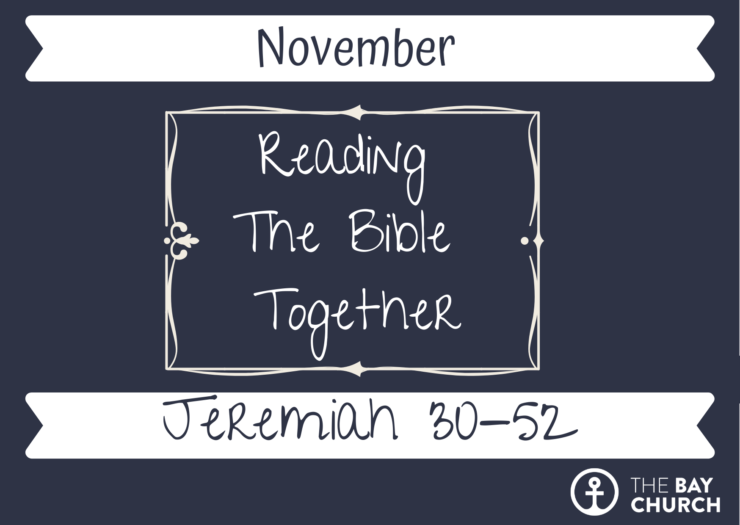RBT for Jeremiah Part 2 Ch. 30-52 – November 2021
The information below can be downloaded here. (Download PDF) there are attitional notes on some relevant dates for Jeremiah here (Download PDF)
Introduction
The prophecies contained in this portion of Jeremiah were all given at some time, during the reigns of the last kings of Judah (Jehoiakim, Jehoiachin and Zedekiah) or in the period immediately after the fall of Jerusalem. However, they are not in chronological order but rather ‘totally muddled up’. The reading plan indicates in which reign the individual prophecies were given.
Jehoiakim’s Reign
After the death of godly Josiah, killed in battle by the Egyptians, the land came under Egyptian rule. Jehoahaz was deposed and Jehoiakim set up as puppet King (609BC). In 605BC Nebuchadnezzar defeated the Egyptians and later besieged Jerusalem. Jehoiakim paid tribute to and became a vassal of the Babylonians. At that time many members of the royal family and nobility, including Daniel, were taken to Babylon. After three years, Jehoiakim revolted, switching allegiance back to Egypt. In 598BC Nebuchadnezzar invaded Judah and laid siege to Jerusalem. Jehoiakim died and his son Jehoiachin ruled in his place. Following their inevitable victory, the Babylonians took Jehoiachin as a prisoner into exile and appointed his uncle Zedekiah to reign in his place. A great number, including members of the royal family, men of valour and craftsmen were taken into exile. 2 Kings speaks of ten thousand captives being taken.
From the beginning of his reign wicked King Jehoiakim led his people further and further into idol worship. Worship of the living God deteriorated into mere superstition and outward formalism. At this time Jeremiah preached in the gate of the temple, denouncing the false belief that the presence of God’s temple would protect Jerusalem from destruction (see chapters 7 and 26). Seized by the people and officials, who all called for his death, Jeremiah was freed but could no longer preach openly in the temple or elsewhere. Chapter 36 tells how the Lord commanded Jeremiah to record all his prophecies in writing. This he did by dictating them to Baruch, his faithful scribe, who wrote all his words on a scroll. Jeremiah chapters 1-7 are thought to record the contents of the scroll. Baruch read this firstly to the nobles and then to the King in person. As the scroll was unrolled Jehoiakim showed his contempt for God’s word by repeatedly cutting off the top of the scroll and throwing it onto the fire. God’s word is not so easily dismissed. The Lord simply commanded Jeremiah to have all the words the King had sought to destroy recorded on a new scroll. “And many similar words were added to them.” Included in this was God’s judgement on Jehoiakim and his family. Chapters 1-10 probably contain the writing on the new scroll. Chapter 45 records God’s special message to the scribe Baruch, telling him not to seek great things for himself but assuring him of God’s protection in the coming days.
Zedekiah’s reign
Jeremiah’s consistent message saying God was bringing judgement on Judah and his advocating submission to Babylon led to most of the nobles regarding him as a traitor. Indeed at the time of the final siege it was thought he might defect and flee the city to join the Babylonian enemy. Zedekiah , however, seemed to have a secret but superstitious respect for the prophet, accepting that he was God’s true servant. In spite of this, the King greatly feared his nobles and generals and did not dare to oppose their determination to continue revolting against Babylonian rule.
About 589BC, following the accession of a new Pharaoh in Egypt, intrigue against Babylon increased. Soon Jerusalem was under siege from the ever powerful Babylonians. Fear led the Jewish nobles to cry to God for help, releasing their Hebrew slaves in order to gain His favour,(see chapter 37) Their ‘repentance’ was short lived and when the siege was raised the freed slaves were forced to return to servitude. During the brief ‘breathing spell’ Jeremiah was seen as a false prophet and a traitor. At the time when the enemy army had withdrawn, Jeremiah set out for his home town of Anathoth. Arrested at the city gates and accused of planning to desert to the Babylonians, he was taken and thrown into a deep and muddy cistern. (Chapter 38). Ebed-melech, an Ethiopian eunuch, hearing of this wickedness, sought the King’s help. Granted thirty (armed?) men he succeeded in rescuing the prophet, and taking him to the safety of the guards’ courtyard, where Jeremiah remained in comparative safety.
Some time after this, Zedekiah sent for the prophet, meeting him privately at one of the entrances to the temple. The King swore he would not have him either executed or handed over to his enemies.(Chapter 38) Jeremiah gave the King God’s promise that if he surrendered to the Babylonians his life would be spared and Jerusalem would not be destroyed by fire. However, if he did not surrender the prophet recounted in some detail the judgements which would fall on Zedekiah, his family and the nation.
Zedekiah instructed Jeremiah, on pain of death, to tell no-one the words Jeremiah had spoken to him. Rather he was to say that he had pleaded with the King not to send him back to die in the house of Jonathan. Jeremiah complied with the King’s command and remained in the guards’ courtyard until the city fell.
The King did not surrender, disobeying God’s words brought to him by Jeremiah. Consequently the judgements threatened by God came down. The city and temple were sacked. Having seen his sons executed before his eyes Zedekiah was blinded by the Babylonians and taken in chains into exile.
Jeremiah was freed at Nebuchadnezzar’s command. He was free to go wherever he pleased. He could go to Babylon, remain in Judah or go elsewhere. He chose to remain with the remnant of poor people left in Jerusalem, placing himself under the protection of the governor appointed by the Babylonians. This governor was subsequently murdered and the people, fearing Babylonian revenge, fled to Egypt. Jeremiah was compelled to go with them and he continued his prophetic ministry there. Chapters 42-43 detail Jeremiah’s warning against going to Egypt and the people’s sin in disobeying God and fleeing there. Chapter 44 was spoken to the Jews now living in Egypt warning them against the sin of idolatry. Chapters 46-51 contain prophecies of God’s judgement on Babylon and other surrounding nations.
Jeremiah ended his life and ministry in Egypt. Chapter 52 was added to complete the account of the exiles who were taken to Babylon. This historical appendix was written at a later date ( See Jeremiah 52:31) and may well have been derived from 2 Kings 25.
RBT Reading Plan for Jeremiah Part 1 Ch 30-52
| Date | Passage | Content |
| Book of Consolation written in Jehoiakim’s reign | ||
| Mon 1st | Jer 30 | The days are coming when the Lord will restore the fortunes of His people. |
| Tues 2nd | Jer 31:1-20 | The Lord will turn their mourning to joy. |
| Wed 3rd | Jer 31:21-30 | The Lord will watch over them to build and to plant. |
| Jer 31:31-40 | The promise of the New Covenant | |
| Prophesies of hope and judgement in Zedekiah’s reign | ||
| Thur 4th | Jer 32:1-25 | During the siege the Lord tells Jeremiah to buy a field. |
| Fri 5th | Jer 32:26-44 | As He has brought the great calamity so also will the Lord bring the good He has promised. |
| Sat 6th | Jer 33:1-13 | God promises restoration to that which was then waste. |
| Sun 7th | Jer 33:14-26 | The Lord will fulfil His covenant with David |
| Mon 8th | Jer 34:1-22 | Judgement pronounced on King Zedekiah |
| Events during Jehoiakim’s reign | ||
| Tues 9th | Jer 35:1-19 | The Rechabite obedience to their ancestors contrasted with Judah’s disobedience to their God. |
| Wed 10th | Jer 36 | Jehoiakim burns Jeremiah’s scroll |
| Events in Zedekiah’s reign leading up to the fall of Jerusalem | ||
| Thur 11th | Jer 37 | Jeremiah repeatedly warns Zedekiah. |
| Fri 12th
|
Jer 38:1-13 | Jeremiah thrown into and then rescued from the cistern. |
| Jer 38:14-28 | Jeremiah gives God’s message to the King secretly. | |
| Sat 13th | Jer 39:1-40:6 | The Lord delivers Jeremiah when Jerusalem falls. |
| Events following the fall of Jerusalem | ||
| Sun 14th | Jer 40:7-41:18 | The assassination of Gedaliah the governor appointed by the Babylonians. |
| Mon 15th | Jer 42 | Jeremiah warns the remnant not to disobey God by going to Egypt. |
| Tues 16th | Jer 43:1-44:14 | Jeremiah is taken as a prisoner to Egypt by those fleeing there. |
| Wed 17th | Jer 44:15-30 | The fruit of idolatry |
| Jer 45 | The Lord’s message to Baruch | |
| God’s judgements against the nations | ||
| Thur 18th | Jer 46 | Judgement against Egypt |
| Fri 19th | Jer 47 | Judgement against the Philistines |
| Sat 20th | Jer 48:1- 20 | Judgement against Moab |
| Sun 21st | Jer 48:21- 47 | Judgement against Moab continued |
| Mon 22nd | Jer 49:1-27 | Judgement against Ammon, Edom and Damascus |
| Tues 23rd | Jer 49:28-39 | Judgement against Kedar, Hazor and Elam |
| Wed 24th | Jer 50:1-27 | Judgement against Babylon |
| Thur 25th | Jer 50:28-46 | The vengeance of the Lord against Babylon |
| Fri 26th | Jer 51:1-23 | The complete destruction of Babylon |
| Sat 27th | Jer 51:24-44 | The Lord repays the Babylonians for all they had done to Zion. |
| Sun 28th | Jer 51:45-64 | The Lord will replay Babylon in full. |
| Historical Appendix added at a later date | ||
| Mon 29th | Jer 52:1-10 | Jerusalem taken and Zedekiah captured |
| Jer 52:11-23 | The city sacked and God’s temple destroyed | |
| Tues 30th | Jer 52:24-30 | The leaders executed and the people taken into captivity |
| Jer 52:31-34 | King Jehoiachin released from prison | |





